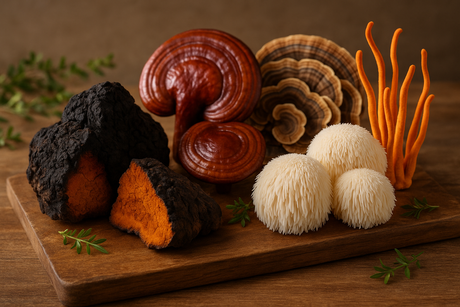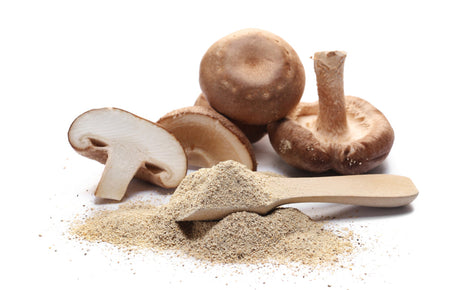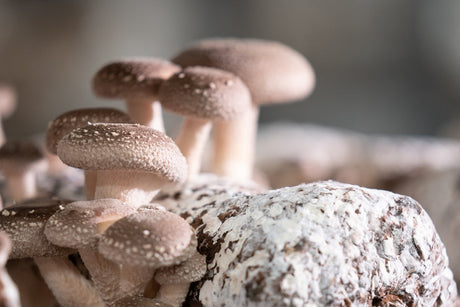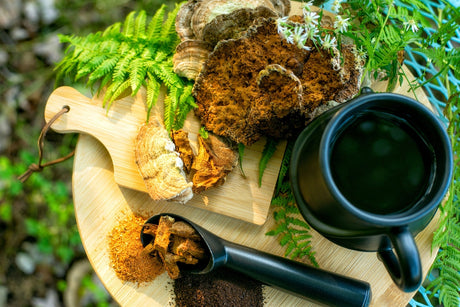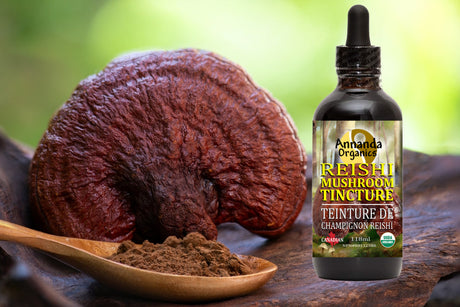In an age where natural remedies are making a powerful comeback, chaga has emerged as a superstar in the world of health and wellness. This intriguing mushroom, often found clinging to birch trees in cold climates, is known for its striking appearance and remarkable health benefits. Packed with antioxidants, vitamins, and minerals, chaga not only boosts the immune system but also has anti-inflammatory properties that can enhance overall well-being.
But there's much more to this fungus than just its health-enhancing qualities. Creative and innovative uses of chaga are cropping up everywhere, from herbal teas to skincare products, revealing just how versatile this superfood can be. Whether you're a health enthusiast or simply curious about incorporating nature's bounty into your routine, understanding the top benefits and uses of chaga will inspire you to unlock its potential. Join us as we delve into the incredible world of chaga and discover how it can transform your health and wellness journey!
Nutritional Profile of Chaga
Chaga, scientifically known as Inonotus obliquus, is a type of fungus that grows predominantly on birch trees in cold regions such as Siberia, Russia, Korea, Northern Europe, Canada, and Alaska. Despite its rough and unattractive exterior, chaga is a nutritional powerhouse. Often referred to as the "king of medicinal mushrooms," it is packed with a wide array of vitamins, minerals, and other beneficial compounds. Among its most notable nutrients are B-complex vitamins, vitamin D, potassium, rubidium, cesium, amino acids, fiber, zinc, iron, magnesium, and calcium. These nutrients synergistically contribute to the overall health benefits that chaga offers.
One of the standout features of chaga is its high concentration of antioxidants. Antioxidants are crucial in protecting the body from oxidative stress and free radical damage, which are linked to a variety of chronic diseases. Chaga contains several types of antioxidants, including melanin, which is responsible for its dark color, and superoxide dismutase (SOD), an enzyme that plays a critical role in combating oxidative stress. Additionally, chaga is rich in polysaccharides, particularly beta-glucans, which are known for their immune-boosting properties.
Moreover, chaga contains significant amounts of triterpenes, specifically betulin and betulinic acid, which are compounds derived from the birch trees on which the fungus grows. These triterpenes have been studied for their potential anti-inflammatory, antiviral, and anticancer properties. The unique combination of these nutrients and bioactive compounds makes chaga an exceptional natural supplement for enhancing health and wellness. This remarkable nutritional profile sets the stage for the myriad health benefits that chaga can provide.
Health Benefits of Chaga
Chaga's diverse and rich nutritional composition translates into a wide range of health benefits. One of the most prominent benefits of chaga is its ability to support and enhance the immune system. The beta-glucaWns found in chaga are particularly effective in modulating the immune response, helping to activate immune cells such as macrophages and natural killer cells. This immune-boosting effect is crucial in defending the body against pathogens and reducing the risk of infections.
Another significant health benefit of chaga is its anti-inflammatory properties. Chronic inflammation is a common underlying factor in many health conditions, including arthritis, heart disease, and diabetes. Chaga's triterpenes and polysaccharides have been shown to reduce inflammation by inhibiting the production of pro-inflammatory cytokines. This anti-inflammatory action can help alleviate symptoms of inflammatory conditions and improve overall health and well-being.
Chaga is also renowned for its potential anticancer properties. Research has demonstrated that compounds found in chaga, such as betulinic acid, can induce apoptosis (programmed cell death) in cancer cells without harming healthy cells. Additionally, chaga's antioxidant properties help protect cells from DNA damage caused by free radicals, which can lead to cancer development. While more research is needed to fully understand chaga's anticancer effects, the preliminary findings are promising and suggest that chaga could be a valuable adjunct in cancer prevention and treatment.
Chaga and Immune System Support
The immune system is the body's defense mechanism against infections, diseases, and other harmful invaders. Maintaining a robust immune system is essential for overall health, and chaga has been shown to play a significant role in immune support. The polysaccharides, especially beta-glucans, present in chaga, are known to enhance the activity of immune cells, thereby boosting the body's ability to fight off infections.
Beta-glucans are complex sugars that stimulate the immune system by activating macrophages, the white blood cells responsible for detecting and engulfing pathogens. These activated macrophages then produce cytokines, which are signaling molecules that help regulate the immune response. This cascade of events results in a more efficient and effective immune system, capable of responding swiftly to infections. Additionally, chaga's immune-modulating properties help maintain a balanced immune response, preventing overactivity that can lead to autoimmune diseases.
Chaga also contains a unique compound called ergosterol, a precursor to vitamin D. Vitamin D is crucial for immune health, as it enhances the pathogen-fighting effects of monocytes and macrophages and decreases inflammation. Many people have suboptimal levels of vitamin D, particularly during the winter months when sun exposure is limited. Incorporating chaga into the diet can help boost vitamin D levels, thereby supporting immune function. Regular consumption of chaga can thus fortify the immune system, making it an excellent natural remedy for enhancing immunity and overall health.
Chaga’s Antioxidant Properties
Antioxidants play a critical role in protecting the body from oxidative stress, which occurs when there is an imbalance between free radicals and antioxidants. Free radicals are unstable molecules that can damage cells, proteins, and DNA, leading to a host of chronic diseases, including cancer, heart disease, and neurodegenerative disorders. Chaga is one of the richest sources of antioxidants, making it a powerful ally in the fight against oxidative stress.
One of the key antioxidants found in chaga is superoxide dismutase (SOD). SOD is an enzyme that catalyzes the dismutation of superoxide radicals into oxygen and hydrogen peroxide, effectively neutralizing these harmful free radicals. Research has shown that high levels of SOD are linked to increased longevity and reduced risk of chronic diseases. By providing a rich source of SOD, chaga helps protect cells from oxidative damage, thereby supporting overall health and longevity.
Another important antioxidant in chaga is melanin, which gives the mushroom its dark color. Melanin is known for its ability to absorb ultraviolet light and neutralize free radicals, protecting cells from UV-induced damage. Additionally, chaga contains phenolic compounds, such as polyphenols and flavonoids, which further contribute to its antioxidant capacity. These compounds have been shown to reduce oxidative stress, lower inflammation, and improve overall health. By incorporating chaga into your diet, you can take advantage of its potent antioxidant properties to protect your cells and promote long-term health.
Innovative Ways to Use Chaga in Your Daily Routine
Incorporating chaga into your daily routine doesn't have to be mundane or repetitive. There are numerous innovative and enjoyable ways to reap the benefits of this remarkable mushroom. One of the most popular methods is brewing chaga tea. Chaga tea is made by steeping dried chaga chunks or powder in hot water, resulting in a rich, earthy beverage. This tea can be enjoyed on its own or blended with other herbs and spices for added flavor and health benefits. Drinking chaga tea regularly can help boost your immune system, reduce inflammation, and provide a steady supply of antioxidants.
Another creative way to use chaga is by incorporating it into smoothies and shakes. Adding a teaspoon of chaga powder to your favorite smoothie recipe can enhance its nutritional profile without altering the taste significantly. This is an excellent option for those who prefer a cold, refreshing beverage over hot tea. You can also experiment with chaga in your cooking and baking. Chaga powder can be added to soups, stews, sauces, and even baked goods like muffins and cookies. Its mild flavor makes it a versatile ingredient that can be easily integrated into various dishes.
For those interested in skincare, chaga can also be used topically. Chaga extract is becoming increasingly popular in skincare products due to its antioxidant and anti-inflammatory properties. It can help protect the skin from environmental damage, reduce redness and irritation, and promote a healthy, glowing complexion. You can find chaga-infused creams, serums, and face masks, or even make your own DIY skincare products at home using chaga powder or extract. By exploring these innovative uses of chaga, you can easily incorporate this superfood into your daily routine and enjoy its numerous health benefits.
Potential Side Effects and Precautions
While chaga is generally considered safe for most people, it is essential to be aware of potential side effects and precautions before incorporating it into your routine. One of the primary concerns with chaga is its potential to interact with certain medications. For instance, chaga may affect blood sugar levels, so individuals taking diabetes medications should consult their healthcare provider before using chaga. Additionally, chaga has anticoagulant properties, which means it can interfere with blood-thinning medications. If you are on any medication, it is crucial to speak with your doctor to avoid any adverse interactions.
Another consideration is the potential for allergic reactions. Although rare, some individuals may be allergic to chaga or other mushrooms. Symptoms of an allergic reaction can include itching, swelling, difficulty breathing, and gastrointestinal distress. If you experience any of these symptoms after consuming chaga, discontinue use immediately and seek medical attention. It is also advisable to start with a small dose of chaga and gradually increase it to monitor your body's response.
Finally, pregnant and breastfeeding women should exercise caution when using chaga. There is limited research on the safety of chaga during pregnancy and lactation, so it is best to err on the side of caution and avoid its use during these periods. As with any supplement, it is essential to use chaga responsibly and consult with a healthcare professional to ensure it is appropriate for your individual needs and circumstances.
Chaga Tea: Preparation and Benefits
Chaga tea is one of the most popular and accessible ways to enjoy the health benefits of chaga. Preparing chaga tea is a simple process that can be done using dried chaga chunks or chaga powder. To make chaga tea with dried chunks, start by breaking the chaga into small pieces, about the size of a walnut. Place a handful of chaga chunks in a pot of water and bring it to a boil. Once boiling, reduce the heat and let it simmer for at least 30 minutes, or up to several hours for a stronger brew. Strain the tea and enjoy it hot or chilled. For added flavor, you can mix in honey, lemon, or other herbs and spices.
If you prefer using chaga powder, the process is even more straightforward. Simply add a teaspoon of chaga powder to a cup of hot water and stir well. Let it steep for a few minutes before straining any remaining solids. Chaga tea made from powder can also be mixed with other teas, such as green tea or herbal blends, to create a unique and flavorful beverage. Drinking chaga tea regularly can help support your immune system, reduce inflammation, and provide a rich source of antioxidants.
In addition to its numerous health benefits, chaga tea is also a delightful and comforting beverage. Its rich, earthy flavor makes it a perfect alternative to coffee or traditional tea, especially for those looking to reduce their caffeine intake. Chaga tea can be enjoyed at any time of the day, whether as a morning energizer, an afternoon pick-me-up, or a relaxing evening drink. By incorporating chaga tea into your daily routine, you can enjoy both its delicious taste and its remarkable health benefits.
Conclusion: Embracing Chaga for a Healthier Lifestyle
Incorporating chaga into your health and wellness routine can offer a multitude of benefits, from boosting your immune system and reducing inflammation to providing a rich source of antioxidants. This remarkable mushroom, with its unique nutritional profile and bioactive compounds, has the potential to transform your health and enhance your overall well-being. By exploring the various ways to use chaga, such as brewing chaga tea, adding it to smoothies, or using it in skincare products, you can easily integrate this superfood into your daily life.
However, it is essential to use chaga responsibly and be aware of potential side effects and interactions with medications. Consulting with a healthcare professional before starting any new supplement is always a wise decision. With proper use and precautions, chaga can be a valuable addition to your health regimen, helping you achieve a healthier, more balanced lifestyle.
In conclusion, the power of chaga lies in its versatility and potent health benefits. Whether you are a seasoned health enthusiast or new to the world of natural remedies, chaga offers a wealth of possibilities to enhance your well-being. Embrace the power of chaga and unlock its potential to support your health and wellness journey.








